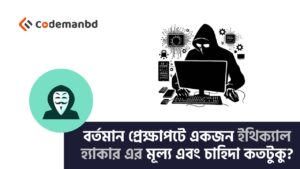With the rise of cyber threats, there is a growing demand for professionals trained in ethical hacking. In Bangladesh, there are various training institutes, such as CodemanBD, CSL Training and Creative IT Institute, that offer comprehensive courses in ethical hacking and cybersecurity.
These courses cover concepts and practical skills necessary to protect against cyber-attacks and ensure the safety of digital assets. By enrolling in an ethical hacking course, individuals can equip themselves with the expertise needed to pursue a successful career in the cybersecurity field.
Among them, the ethical hacking course of CodemanBD provides hands-on training to master the techniques hackers use and fortify network systems in Bangladesh. As cybersecurity becomes increasingly important, individuals and organizations are recognizing the need for ethical hackers who possess the skills to identify vulnerabilities and secure digital systems.
Understanding The Basics of Ethical Hacking
Introduction to Ethical Hacking And Its Importance in Bangladesh

Ethical hacking, also known as penetration testing or white-hat hacking, is a practice of legally and ethically hacking into computer systems and networks to identify vulnerabilities and weaknesses. In Bangladesh, the demand for ethical hackers has been growing rapidly as organizations and individuals alike recognize the importance of securing their digital assets and protecting themselves from cyber threats.
Key Concepts And Principles of Ethical Hacking
There are several key concepts and principles that every aspiring hacker should understand. Let’s take a closer look at these fundamentals:
- Authorized access: Ethical hacking is always conducted with proper authorization and permission from the owner of the system or network being tested. This ensures that the hacking activities are legal and carried out in an ethical manner.
- Information gathering: Before attempting to hack into a system, ethical hackers perform extensive research and reconnaissance to gather information about the target. This helps them understand the vulnerabilities and potential entry points.
- Attack vectors: Ethical hackers utilize various attack vectors, such as network scanning, social engineering, and brute-force attacks, to test the security of a system. This allows them to identify weak spots and potential areas of exploitation.
- Vulnerability assessment: The process of vulnerability assessment involves identifying and evaluating potential vulnerabilities and weaknesses in a system or network. Ethical hackers use specialized tools and techniques to discover these vulnerabilities.
- Exploitation: Once vulnerabilities are identified, ethical hackers attempt to exploit them to gain unauthorized access and control over the system. This helps them demonstrate the potential consequences of those vulnerabilities.
- Reporting and mitigation: Ethical hackers, after successfully identifying and exploiting vulnerabilities, provide detailed reports to system owners, outlining the weaknesses and suggesting appropriate mitigation strategies. This allows organizations to fix the vulnerabilities and enhance their overall security posture.
Necessary Skills for Becoming An Ethical Hacker in Bangladesh
Ethical hacking plays a vital role in safeguarding sensitive information and strengthening network systems. In Bangladesh, the demand for ethical hackers is steadily growing as organizations recognize the need to protect their digital assets. To excel in this field, individuals interested in pursuing a career as an ethical hacker need to possess a combination of technical skills and essential soft skills. Let’s delve into these skills in more detail.
Technical Skills Required For Ethical Hacking In Bangladesh:

Becoming an ethical hacker requires proficiency in various technical skills. These skills serve as the foundation for effectively identifying vulnerabilities, assessing risks, and implementing robust security measures. The following are some of the key technical skills that aspiring ethical hackers should acquire:
- Networking Knowledge: A strong understanding of networking concepts and protocols is essential. Ethical hackers need to be well-versed in TCP/IP, routers, switches, and firewalls in order to identify potential entry points.
- Operating System Expertise: Proficiency in operating systems such as Windows, Linux, and macOS is crucial. Ethical hackers should possess the ability to navigate and exploit vulnerabilities in different operating systems.
- Programming Languages: Knowledge of programming languages like Python, JavaScript, and C/C++ is advantageous. It allows ethical hackers to create their own scripts and tools for penetration testing.
- Vulnerability Assessment and Penetration Testing (VAPT): Ethical hackers should be skilled in conducting VAPT to identify vulnerabilities and simulate real-world attacks. Tools like Metasploit and Nessus are commonly used in this process.
- Web Application Security: Understanding web technologies such as HTML, CSS, and JavaScript is essential for web application security testing. Ethical hackers should be able to identify common web vulnerabilities like SQL injection and cross-site scripting.
- Wireless Security: Proficiency in wireless security protocols and tools is necessary to identify vulnerabilities in Wi-Fi networks and prevent unauthorized access.
Essential Soft Skills for Ethical Hackers in The Bangladeshi Context:
Apart from technical skills, ethical hackers in Bangladesh need to possess specific soft skills to excel in their role. These skills complement their technical expertise and are essential for effective communication, teamwork, and problem-solving. The following are some key soft skills that aspiring ethical hackers should develop:
- Strong Analytical Skills: Ethical hackers should have the ability to analyze complex systems and identify potential vulnerabilities. This involves critical thinking, problem-solving, and attention to detail.
- Effective Communication: Ethical hackers often need to communicate their findings and recommendations to technical and non-technical stakeholders. Strong verbal and written communication skills are necessary to convey information clearly and concisely.
- Ethics and Integrity: Ethical hackers should possess a strong moral compass and adhere to a strict code of ethics. They must maintain confidentiality, professionalism, and act responsibly when handling sensitive information.
- Continuous Learning: The field of cybersecurity is constantly evolving, and ethical hackers need to stay updated with the latest industry trends and techniques. A passion for continuous learning and self-improvement is crucial.
- Collaboration and Teamwork: Ethical hackers often work as part of a larger cybersecurity team. The ability to collaborate, share knowledge, and work well with others is essential for a successful career.
By acquiring the necessary technical skills and essential soft skills, individuals in Bangladesh can position themselves for a successful career as an ethical hacker. Pursuing relevant certifications and gaining hands-on experience through practical training programs can further enhance their expertise in the field of ethical hacking.
Choosing The Right Ethical Hacking Course in Bangladesh
Factors To Consider When Selecting An Ethical Hacking Course

Choosing the right ethical hacking course is crucial for aspiring cybersecurity professionals in Bangladesh. With numerous training institutes offering ethical hacking courses, it can be challenging to determine which one is the best fit for your needs. To help you make an informed decision, here are some essential factors to consider:
- Course Content: It’s important to evaluate the course content and syllabus to ensure that it covers all the necessary topics and techniques. Look for courses that provide comprehensive training on different aspects of ethical hacking, including penetration testing, vulnerability assessment, and network security.
- Instructor Expertise: The expertise and experience of the instructors play a crucial role in the quality of training you receive. Seek out courses taught by industry professionals who have a strong background in ethical hacking and cybersecurity. Instructors with relevant certifications like Certified Ethical Hacker (CEH) or Offensive Security Certified Professional (OSCP) demonstrate their credibility and knowledge in the field.
- Training Methods: Different training institutes may have varied approaches to delivering the course material. Consider whether you prefer hands-on practical sessions, interactive classroom-based learning, or a combination of both. Practical experience is essential in ethical hacking, so look for courses that provide ample opportunities for hands-on exercises and real-world simulations.
- Reputation and Reviews: Do thorough research on the training institutes you are considering. Look for reviews and testimonials from previous students to gain insights into their experiences. Seek out courses that have a positive reputation for delivering high-quality training and producing skilled ethical hackers.
- Certification: Obtaining a recognized certification can boost your career prospects in ethical hacking. Look for courses that offer certification exams, such as CEH, as part of their training package. Ensure that the certification is widely recognized in the industry to enhance your credibility and job prospects.
Evaluating The Credibility And Quality Of Ethical Hacking Training Institutes In Bangladesh
It is essential to evaluate the credibility and quality to select an ethical hacking training institute in Bangladesh. Here are some key factors to consider:
- Accreditation: Check if the training institute is accredited by reputable organizations or industry associations. Accreditation ensures that the courses meet certain standards and that the institute follows ethical practices.
- Industry Partnerships: Look for institutes that have partnerships or collaborations with renowned cybersecurity organizations or companies in Bangladesh. This indicates that the institute is recognized and supported by industry leaders, enhancing the value of the training provided.
- Faculty Qualifications: Research the qualifications and expertise of the faculty members at the training institute. Ensure that they have the necessary certifications and industry experience to deliver high-quality training.
- Infrastructure and Facilities: Consider the infrastructure and facilities available at the training institute. Ethical hacking requires access to advanced tools and systems, so ensure that the institute provides a conducive learning environment with the necessary resources.
- Placement Assistance: Find out if the training institute offers placement assistance or career support after completing the course. A good institute will help you connect with job opportunities in the cybersecurity industry and provide guidance for launching your career.
By considering these factors when selecting an ethical hacking course and evaluating the credibility and quality of training institutes in Bangladesh, you can make an informed decision that aligns with your career goals.
Course Curriculum Of CodmanBD’s Ethical Hacking Course
When it comes to acquiring the necessary skills to combat cyber threats, an ethical hacking course is a must. In Bangladesh, there are various renowned institutes offering comprehensive ethical hacking training programs. These courses aim to equip students with the knowledge and practical skills required to secure network systems and safeguard against cyberattacks.
Overview Of The Modules And Topics Covered in Ethical Hacking Courses
The course curriculum of ethical hacking in Bangladesh encompasses a wide range of modules and topics that provide students with a holistic understanding of cybersecurity. Here, we present a breakdown of the key modules covered in these courses:
| Module | Topics Covered |
| Introduction to Ethical Hacking | Basics of ethical hacking, introduction to hacking terminologies and methodologies |
| Networking Essentials | Understanding network protocols, IP addressing, TCP/IP concepts |
| Information Gathering | Open-source intelligence (OSINT) techniques, footprinting, scanning, enumeration |
| Vulnerability Assessment | Identifying vulnerabilities, vulnerability scanning and analysis |
| System Hacking | Password cracking, privilege escalation, rootkits, and malware |
| Web Application Hacking | SQL injection, cross-site scripting (XSS), session hijacking, and web application firewalls |
| Wireless Network Security | Wireless network vulnerabilities, securing wireless networks |
| Mobile Security | Mobile device vulnerabilities, securing mobile applications |
| Penetration Testing | Planning, conducting, and reporting the results of penetration tests |
| Cloud Security | Securing cloud infrastructure, cloud-based attacks, and defenses |
In-depth Analysis Of The Practical Skills And Knowledge Acquired Through The Course
Throughout the ethical hacking course in Bangladesh, students gain practical skills and knowledge that are crucial for a career in cybersecurity. Here’s a breakdown of the key areas of expertise students acquire:
- Hands-on Experience: Students receive hands-on training to simulate real-world scenarios, allowing them to practice techniques such as scanning, enumeration, and exploiting vulnerabilities.
- Vulnerability Assessment and Exploitation: By understanding the methodologies employed by hackers, students learn how to identify vulnerabilities in systems, software, and networks, and exploit them ethically to strengthen security measures.
- Web Application Security: Students gain expertise in identifying and mitigating web application vulnerabilities, including SQL injection, cross-site scripting, and session hijacking, ensuring secure web environments.
- Wireless Network Security: With a focus on wireless network vulnerabilities, students learn how to secure wireless networks, including encryption protocols, access control, and intrusion detection systems.
- Penetration Testing Skills: Students develop proficiency in planning, conducting, and reporting the results of penetration tests, enabling organizations to identify and rectify vulnerabilities before they are exploited.
By completing an ethical hacking course in Bangladesh, students are prepared to combat the evolving cybersecurity landscape. They acquire the necessary skills to effectively protect systems, networks, and data from malicious hackers, making them valuable assets in today’s digital world.
Examining The Benefits Of Ethical Hacking Certification In Bangladesh
Advantages of obtaining an ethical hacking certification in Bangladesh
Ethical hacking has become a crucial skill in today’s digital landscape. As technology advances, so do the threats and vulnerabilities faced by organizations and individuals. To combat these challenges and ensure the security of their systems, businesses in Bangladesh are increasingly recognizing the importance of hiring certified ethical hackers.
Obtaining an ethical hacking certification offers several advantages for individuals who aspire to pursue a career in this field and contribute to the growing demand for cybersecurity professionals in Bangladesh.
How certification enhances career prospects in the Bangladeshi job market
With the rapid digitization of industries and the increasing frequency of cyber attacks, the demand for skilled ethical hackers is skyrocketing in Bangladesh. By earning an ethical hacking certification, you position yourself as a qualified professional who possesses the necessary skills and knowledge to safeguard systems against cyber threats.
The following are some ways in which certification enhances your career prospects:
- Increased employability: With an ethical hacking certification, you become a highly sought-after candidate for cybersecurity positions in various organizations in Bangladesh. Employers prioritize candidates who have demonstrated their expertise through certification, giving you a competitive edge over other job applicants.
- Better salary potential: Certified ethical hackers can command higher salaries due to their specialized knowledge and the critical role they play in protecting valuable information. In Bangladesh, the average salary of an ethical hacker is considerably higher than that of non-certified professionals in the field.
- Career advancement opportunities: Having a recognized ethical hacking certification opens doors to career advancement within the cybersecurity field. You may qualify for promotions, leadership roles, or even entrepreneurial opportunities as organizations value the skills and expertise of certified professionals.
Earning an ethical hacking certification demonstrates your commitment to continuous learning and professional development. It showcases your dedication to staying up-to-date with the latest hacking techniques, technologies, and best practices, making you an invaluable asset to employers in Bangladesh’s job market.
Ethical Hacking Career Opportunities In Bangladesh
With the increasing prevalence of cyber-attacks and data breaches, the demand for ethical hackers has seen a significant rise in Bangladesh. Ethical hacking, also known as penetration testing, refers to the practice of identifying vulnerabilities in computer systems, networks, and applications. It involves using the same techniques as malicious hackers but with the intent of finding and fixing security loopholes to protect organizations from potential threats.
Exploring The Various Job Roles And Positions Available For Ethical Hackers In Bangladesh
As the field of ethical hacking continues to grow, so do the career opportunities in Bangladesh. By pursuing an ethical hacking course, you can unlock a range of job roles and positions that align with your interests and skill set. Some of the most sought-after job roles in Bangladesh’s ethical hacking industry include:
- Penetration Tester
- Security Analyst
- Cybersecurity Consultant
- Network Security Engineer
- Ethical Hacking Instructor
- Security Auditor
- Chief Information Security Officer (CISO)
- Web Application Security Analyst
- Malware Analyst
Each of these job roles requires a unique combination of skills and expertise, allowing professionals to specialize in various areas of ethical hacking. Whether you prefer to work in ethical hacking consulting, cybersecurity management, or research and development, the opportunities are vast in Bangladesh.
Salary Prospects And Growth Opportunities In The Ethical Hacking Field in Bangladesh
A career in ethical hacking can be highly rewarding in Bangladesh. The demand for skilled ethical hackers has resulted in competitive salary packages and lucrative compensation benefits. The average salary of an ethical hacker in Bangladesh varies based on factors such as experience, skill level, and job position.
According to industry reports, entry-level ethical hackers can earn an average salary of approximately BDT 600,000 to BDT 800,000 per year in Bangladesh. With experience and specialized certifications, such as Certified Ethical Hacker (CEH) or Offensive Security Certified Professional (OSCP), professionals can expect their salary to go beyond BDT 1 million per year.
In addition to attractive compensation, the ethical hacking field also offers significant growth opportunities. As technology continues to advance and cybersecurity threats become more sophisticated, the demand for ethical hackers is expected to rise exponentially. This opens doors for career advancement, skill enhancement, and the possibility of becoming a recognized cybersecurity expert in Bangladesh.
So, if you have a passion for technology, problem-solving skills, and a desire to protect organizations from cyber threats, pursuing a career in ethical hacking in Bangladesh can be a wise choice. With the right skills, certifications, and industry experience, you can make a significant impact in the field of cybersecurity and contribute to safeguarding Bangladesh’s digital landscape.
Challenges And Future Trends in Ethical Hacking in Bangladesh
Addressing The Challenges Faced By Ethical Hackers In Bangladesh:
Ethical hackers in Bangladesh face several challenges in carrying out their work effectively and efficiently. Here are some key challenges they encounter and how they address them: 1. Limited awareness and understanding: One of the primary challenges faced by ethical hackers in Bangladesh is the limited awareness and understanding of the importance of cybersecurity. Many individuals and organizations are still unaware of the threats posed by hackers and the need for proactive measures to protect their systems. To address this, ethical hackers strive to educate and create awareness among individuals and organizations about the need for ethical hacking and cybersecurity measures. 2. Lack of adequate infrastructure and resources: In Bangladesh, ethical hackers often face challenges due to the lack of adequate infrastructure and resources. Limited access to high-speed internet, outdated hardware and software, and insufficient cybersecurity tools and technologies can hinder their ability to identify and mitigate security vulnerabilities effectively. Ethical hackers work towards finding alternative solutions, collaborating with organizations to improve their infrastructure, and advocating for better resources and funding for cybersecurity initiatives in the country. 3. Limited policy framework and legal support: Another challenge faced by ethical hackers in Bangladesh is the lack of a comprehensive policy framework and legal support for their work. The absence of specific laws and regulations related to ethical hacking can create uncertainty and potential legal risks for ethical hackers, even when they are working in the best interest of organizations. To address this, ethical hackers actively participate in policy advocacy, engaging with relevant authorities to establish a legal framework that supports their work and protects them from unnecessary legal challenges.
Emerging Trends And Technological Advancements In The Ethical Hacking Domain In Bangladesh:
Bangladesh is witnessing significant growth in the field of ethical hacking, driven by emerging trends and technological advancements. Here are some key trends shaping the ethical hacking domain in Bangladesh: 1. Increased adoption of penetration testing: Penetration testing, also known as ethical hacking, is gaining popularity in Bangladesh as organizations recognize the importance of proactive measures to identify and address vulnerabilities in their systems. Ethical hackers are being actively hired by organizations to conduct penetration testing exercises, providing valuable insights into potential security weaknesses and recommending solutions for strengthening the cybersecurity posture. 2. Focus on mobile and IoT security: With the rapid digitalization in Bangladesh, there is a growing focus on mobile and Internet of Things (IoT) security. Ethical hackers are honing their skills in identifying vulnerabilities in mobile applications, IoT devices, and connected systems. This trend reflects the need to protect sensitive data and ensure the secure functioning of mobile and IoT technologies in various sectors. 3. Artificial intelligence and machine learning in cybersecurity: The use of artificial intelligence (AI) and machine learning (ML) in cybersecurity is another emerging trend in Bangladesh. Ethical hackers are exploring ways to leverage AI and ML techniques to enhance their capabilities in detecting and responding to cyber threats. These technologies enable advanced threat detection, anomaly detection, and automated incident response, augmenting the effectiveness of ethical hacking practices. 4. Collaboration and knowledge sharing: Ethical hackers in Bangladesh are increasingly recognizing the importance of collaboration and knowledge sharing within the community. Various forums, conferences, and online platforms have emerged to facilitate networking and exchange of ideas among ethical hackers. This trend fosters a culture of continuous learning and helps in collectively addressing new and evolving cybersecurity challenges. In conclusion, ethical hacking in Bangladesh faces challenges related to limited awareness, infrastructure, and legal framework. However, the field is witnessing positive trends with increased adoption of penetration testing, focus on mobile and IoT security, utilization of AI and ML in cybersecurity, and enhanced collaboration among ethical hackers. These trends indicate a promising future for ethical hacking in Bangladesh, as it plays a crucial role in securing the digital ecosystem of the country.
Ethical Hacking Course Best Practices: Tips And Recommendations
Useful Tips For Aspiring Ethical Hackers In Bangladesh
If you are considering pursuing a career in ethical hacking in Bangladesh, it is important to equip yourself with the necessary skills and knowledge to succeed in this field. Here are some useful tips to help you on your journey:
- Stay updated with the latest cybersecurity trends and technologies: The world of hacking is constantly evolving, and it is crucial to stay updated with the latest trends, tools, and techniques in cybersecurity. Follow industry blogs, join online forums, and participate in relevant webinars to ensure you are aware of the latest developments.
- Develop a strong foundation in computer networks and programming languages: To excel in ethical hacking, it is essential to have a strong understanding of computer networks and programming languages such as Python, C++, and Java. Familiarize yourself with different operating systems and learn how to identify vulnerabilities.
- Practice continuous learning and hands-on experience: Ethical hacking is a hands-on field that requires practical skills. Engage in practical exercises, participate in Capture the Flag (CTF) competitions, and work on real-world scenarios to sharpen your skills. Continuously learn from your experiences and strive to improve your skills.
- Build a strong network and collaborate with others: Networking is essential in the cybersecurity industry. Connect with professionals and experts in the field, join professional associations, and attend conferences or meetups to expand your network. Collaborate with others to learn new techniques and approaches.
- Always adhere to ethical guidelines and legal boundaries: As an ethical hacker, it is important to prioritize ethics and legality. Obtain proper consent and authorization before conducting any penetration testing or vulnerability assessments. Respect privacy and confidentiality, and always adhere to ethical guidelines and legal boundaries.
Recommendations For Making The Most Of An Ethical Hacking Course In Bangladesh
If you have decided to enroll in an ethical hacking course in Bangladesh, here are some recommendations to help you make the most out of your learning experience:
- Choose a reputable training provider: Research and select a reputable training provider that offers comprehensive and updated course content. Look for trainers who are experienced professionals in the field and can provide practical insights and real-world examples.
- Set specific goals and objectives: Clearly define your goals and objectives for taking the course. Identify the specific skills and knowledge you want to acquire and tailor your learning journey accordingly. This will help you stay focused and motivated throughout the course.
- Allocate dedicated study time: Ethical hacking requires dedication and consistent effort. Allocate dedicated study time each day to learn and practice the concepts taught in the course. Regular practice will reinforce your understanding and help you retain the knowledge effectively.
- Participate actively in discussions and exercises: Actively participate in discussions, exercises, and practical sessions during the course. Engage with your instructors and fellow students, ask questions, and share your insights. This will enhance your learning experience and provide opportunities for collaboration.
- Experiment with the tools and techniques learned: Put your newly acquired knowledge into practice by experimenting with different tools and techniques. Set up a virtual lab environment to simulate real-world scenarios and practice implementing security measures and testing vulnerabilities.
- Seek continuous improvement and professional certifications: Ethical hacking is a field that requires continuous learning and improvement. Stay updated with new technologies and industry certifications. Seek relevant certifications such as Certified Ethical Hacker (CEH) to enhance your credibility and career prospects.
Conclusion
Master the techniques hackers use to penetrate network systems and fortify your own system against it with CodemanBD’s Ethical Hacking course in BD. Gain hands-on training and become an expert in ethical hacking. With the increasing demand for cybersecurity professionals, this course can open doors to a successful career.
Enroll now to take an ethical hacking course in BD and secure your future in the field of ethical hacking and cybersecurity.









